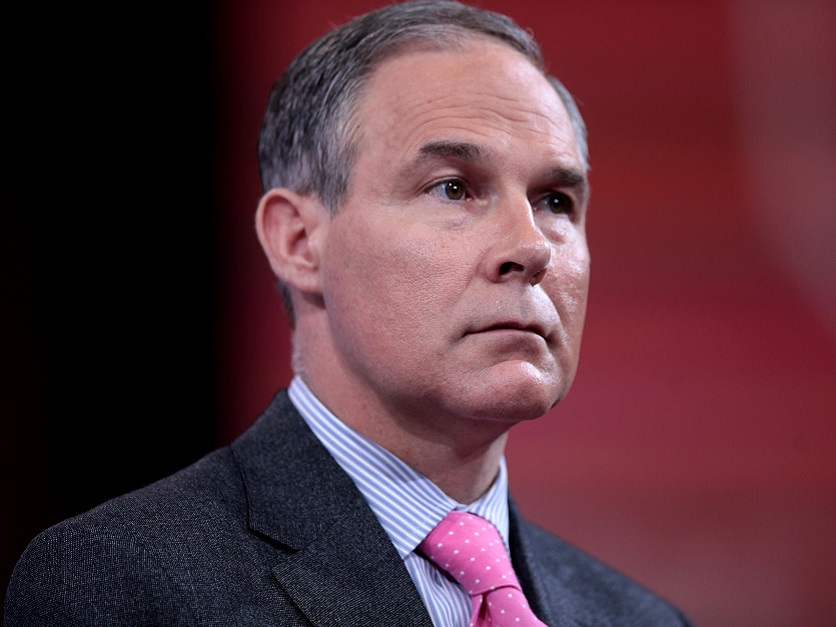WASHINGTON, March 1, 2017 - The EPA will write a new definition of “waters of the United States” that is less expansive than the Obama administration’s rule that the agency is withdrawing, EPA Administrator Scott Pruitt said today in an exclusive Agri-Pulse interview.
Pruitt declined to estimate how long it would take for the agency to write a new WOTUS rule, which spells out what wetlands, streams, ditches and other land features are regulated by the Clean Water Act.
But the Trump administration is shifting away from using a legal approach followed by the Obama rule that appeared to extend the law’s jurisdiction to some wetlands and other areas that were not considered regulated before.
The Obama rule “defined waters of the United States so broadly … that there really weren’t any boundaries between federal and state jurisdiction,” said Pruitt, who as Oklahoma’s attorney general filed one of several lawsuits against the rule.
“Federal jurisdiction usurped and displaced state jurisdiction. So that needs to be fixed. We need regulatory certainly around that, so that’s what we’re going to seek to achieve.”
Pruitt, who is in his second week on the job, also said that he wanted to accelerate the approval process for pesticides and industrial chemicals and was seeking to protect from spending cuts EPA’s funding programs for water infrastructure.
“We’re already in discussions on how to” speed the approval process for pesticides and chemicals, he said. “It’s absolutely a commitment that I’m seeking to establish,” he said.
The White House is planning deep cuts in non-defense discretionary spending at EPA and across the government. According to reports, the White House may propose slashing EPA’s $8 billion budget by 24 percent alone. Pruitt said it was too soon to say what areas at his agency would be reduced. The state and tribal grant programs alone that he wants to protect account for 42 percent of EPA’s total budget.
In a White House ceremony with President Trump on Tuesday, Pruitt signed an advance notice of proposed rule-making (ANPR) that starts the process of replacing the Obama administration’s WOTUS rule.
The new rule will be developed in conjunction with the Army Corps of Engineers, which shares responsibility for enforcing the Clean Water Act. The new administration wants to limit the law’s jurisdiction to how it was interpreted by the late Justice Antonin Scalia in the Supreme Court’s 2006 Rapanos decision. Scalia said the law grants jurisdiction only over "relatively permanent bodies of water.”
The Obama administration had been adhering to a separate opinion written by Justice Anthony Kennedy that said wetlands and other water bodies with a “significant nexus” to navigable waters also were subject to jurisdiction under the water law. Scalia’s opinion was signed by the court’s other three conservative justices at the time. Kennedy sided with them in the outcome of the case but wrote his separate opinion.
Pruitt said Kennedy’s “significant nexus” terminology entailed a subjective approach to defining federal jurisdiction. It “provided no objective criteria. It’s a case-by-case review. That’s the poorest form of rule-making. Rule-making and regulations ought to provide a framework … for people to make decisions, allocate resources and know what’s expected of them,” he said.
So, the new rule will be less expansive than the Obama rule? “Yes, yes,” he replied.
Obama’s EPA “so expanded jurisdiction of the Clean Water Act that it just made it a statute like Congress never intended it to be. They never intended the EPA to have … jurisdiction over puddles and dry creek beds across the country,” he said.
“That has to be fixed going forward, and that means the Kennedy definition is something that doesn’t provide” the necessary clarity, he said.
The Obama rule included language for making case-by-case determinations of whether streams or wetlands would be deemed tributaries of a navigable waterway. “Significant nexus” was broadly defined in the rule as meaning a wetland or other water body that “significantly affects the chemical, physical, or biological integrity” of a navigable waterway. A wide variety of wetland functions could have met the definition, ranging from sediment trapping to the presence of waterfowl.
Environmentalists dispute the Trump administration’s criticism of the rule. The rule was “grounded in science and law” and was “developed over many years, after more than 1 million public comments,” said Rhea Suh, president of the Natural Resources Defense Council. “We all rely on healthy wetlands to curb flooding, filter pollutants, support fish, waterfowl and wildlife, and feed our rivers and lakes.”
Because Pruitt was tied up with the WOTUS issue, he said he was unaware of a kerfuffle that erupted in the renewable fuels industry on Tuesday when rumors surfaced that Trump would issue a “not negotiable” executive order that would change the point of obligation under the Renewable Fuel Standard. Refiners are lobbying EPA to shift the responsibility for meeting biofuel usage mandates to fuel marketers.
Tuesday’s reports indicated that the executive order would have changed the point of obligation in exchange for administrative assistance on a Reid vapor Pressure (RVP) waiver that would allow E15 – a gasoline blend with 15 percent ethanol – to be sold during the summer months.
EPA is reviewing comments on the issue. “I’ve not seen any kind of summary from our office on that process yet,” he said.
#30


